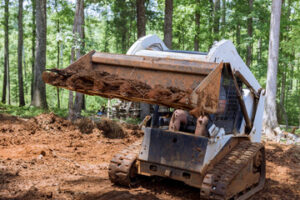Excavating Contractor oversees the changing of land, often using heavy machinery. Their work is critical to building projects and ensuring that roads and buildings are safe to use.

Licensed excavation companies can handle various tasks including digging for foundations, trenching and backfilling. They can also help navigate property permits and develop project timelines.
One of the most important duties an excavating contractor must perform is to prepare the site for construction. This is accomplished by clearing away any debris and reshaping the land. It also involves excavation, which consists of digging and removing earth to create a foundation for the building. This is a complex process that requires precision and attention to detail. It is also necessary to ensure that the soil conditions will support the structure, which entails a soil test and analysis.
The excavation contractor will also build temporary or permanent roadbeds to enable other construction machinery to access the project site. This helps to reduce congestion and prevent damage to the surrounding environment. They will also ensure that any sensitive artifacts or habitats are protected from the heavy equipment and traffic. Additionally, they will separate debris for proper disposal and follow local ordinances regarding landfill requirements.
This preparation is crucial to the success of any construction project. Inexperienced or careless work in this phase can have long-term ramifications for the entire project. It is crucial to have a professional excavation company with extensive experience and the appropriate equipment to complete this task.
Once the site is cleared, excavating contractors can start preparing it for the installation of utilities and other infrastructure. This will include digging trenches for water, gas, electricity, sewer, and telecommunication lines. These vital services will allow construction to move forward, and they will also play a critical role in the safety of those working on the project.
During this phase, the excavation company will carefully remove trees, rocks, and other impediments to the project. They will also dig drains and create proper drainage systems to help prevent flooding and erosion. This is a critical part of the site prep, and it should be completed by experienced professionals who are licensed and insured.
Once the land is clear, the excavation contractor will begin grading and excavating to create a foundation for the building. They will then install the required utilities and infrastructure. This is a complex process that must be done in accordance with engineering specifications.
Installation of Utilities
Modern construction sites rely on a complex network of underground utilities. These include pipelines and conduits for water, sewage, electricity, gas, and telecommunications. Excavating contractors work to ensure that these important infrastructure components are properly installed and integrated into the construction site. This involves creating trenches or conduits for the pipes and cables and ensuring that they are adequately laid out, providing seamless functioning and accessibility for future maintenance and repair.
While excavation may seem like a simple task, it is far from it. It requires a great deal of skill and equipment to complete safely. A professional excavation company can help you with all aspects of the job, from removing large structures to digging foundations for new buildings. They also have the skills and knowledge to clear drainage ditches and level ground. This is a crucial aspect of construction, as improper drainage can cause soil erosion, which damages the surface and causes cracks in the building’s foundation.
If you’re planning a swimming pool, want to install a sprinkler system in your yard, or are building a shed or home addition, these projects are considered mid-size by most excavating companies. If you are preparing a lot for an apartment building, commercial building, sewer system, road, or railway construction project, this is a massive undertaking and will require substantial excavation services.
Aside from working on construction projects, a good excavation contractor will also be familiar with residential and commercial demolition. Whether you’re tearing down an old garage or building a new house, excavation companies know how to get the job done quickly and efficiently without harming surrounding property or causing any damage.
An excavating company can also provide services to install or repair water lines and sewage systems. This may involve traditional excavation or trenchless methods such as pipe bursting. If you have an older, damaged, or malfunctioning water line, excavation companies can drain the line and then break it up piece by piece using specific equipment. This technique avoids the need to shut down roads or sidewalks and saves municipalities the cost of replacing existing infrastructure above the damaged line.
Management of the Project
The excavation phase is a critical aspect of any construction project and sets the foundation for all that follows. It requires precision and a thorough understanding of the soil, as well as adherence to strict safety protocols and equipment operation skills. As a result, it creates many jobs and contributes to the overall economy.
The tasks that excavating contractors perform include the digging of foundations, swimming pools and septic systems, trenching, backfilling, grade and leveling of ground, site clearing and demolition work, as well as utility locating and marking. Each of these activities demands an in-depth knowledge of the terrain and precise planning to ensure a successful completion of the work on time and within budget.
For example, when building a foundation for a new home, excavation contractors will dig a deep hole that is large enough to accommodate the structure’s footprint and ensure its structural integrity. In addition, they may build retaining walls to prevent erosion or lay piping for drainage. They will also ensure that the soil is compacted and dense to provide a strong foundation for the house.
It is essential that any excavation job has the correct coordination between contractors, engineers, and local authorities to ensure the process complies with regulations. Additionally, it is important that all aspects of the excavation are completed on time to avoid delays in the overall construction timeline.
Experienced excavation contractors are able to streamline operations and manage resources effectively. They are able to complete the job on time and ensure that all stages are carried out according to plan, regardless of the complexity of the site.
Excavating contractors use a wide range of heavy machinery to carry out their tasks, including bulldozers and backhoes. They must be highly skilled at operating these machines to ensure they are safe and efficient. They are also responsible for ensuring that all equipment is properly maintained to reduce the risk of accidents or breakdowns during the excavation process.
A professional excavation contractor will inspect the site before beginning the task. They will test the soil to determine its composition and make a plan for how to excavate the area. This will help them to minimise the risks associated with working on a new construction site, as they can anticipate any potential problems before they occur.
Safety
The roar of heavy machinery, the precision of expert hands shaping the earth—construction is an exciting business. But underneath all that is a critical need for safety. Taking shortcuts on site safety protocols can end in disaster, costing money, time, and human lives. That’s why it is crucial to partner with an excavation contractor who will always put your team’s safety first.
Excavation work carries many inherent risks, from cave-ins to contact with live electrical or gas lines. An experienced excavation contractor will know how to identify and address these risks before the project gets underway, keeping your crews safe and on-task.
Safety training is a must, and an effective workplace safety program will incorporate both onsite and offsite training. It should also include a safety inspection process that identifies potential hazards, such as unstable soil conditions or nearby structures that could be compromised by excavation activities.
Another important safety concern is buried utility damage, and an excavating contractor should make sure all existing structures are mapped and marked before digging begins. This can be done by contacting local utilities and asking for markings or by using ground-penetrating radar. In addition, an excavation contractor should use non-destructive digging techniques whenever possible.
An experienced excavation contractor will ensure that their crews are familiar with the latest safety protocols and will have the right equipment for each job. For example, a pool removal will require specialized excavation equipment to drain the water, break up the fiberglass and concrete, and remove it piece by piece. This type of equipment will allow the contractor to minimize property damage while working safely and efficiently.
In addition, an excavation contractor will have a system for tracking all the equipment they own and lease. This will ensure that all equipment is on the jobsite when needed and will help to prevent theft or other loss. They should also have a policy for recording all work-related incidents, including accidents and near-misses, so they can quickly identify and learn from any issues.
